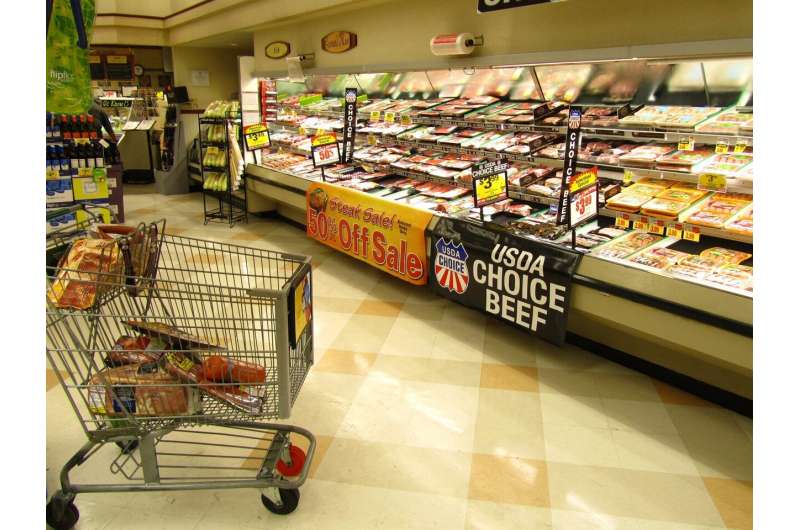This article has been reviewed according to Science X's editorial process and policies. Editors have highlighted the following attributes while ensuring the content's credibility:
fact-checked
peer-reviewed publication
trusted source
proofread
Study: Grocery shopping habits prove credit worthiness, aiding those without credit history

Recent advances in artificial intelligence and machine learning, coupled with the evolution of large-scale data storage, access and processing technologies, have fueled interest among financial institutions in new data sources for credit scoring.
Examples of these new sources include bill payment histories for phone, utility and streaming services; transaction records from checking, savings and money market accounts; and rent payment histories. The motive is twofold—pursuit of profit, including generating new accounts, and improving social welfare by extending credit access to those who lack traditional credit scores.
New research from the University of Notre Dame shows that repeated trips to the grocery store may be all that's necessary to prove creditworthiness.
The paper titled "Using Grocery Data for Credit Decisions" is forthcoming in Management Science from Joonhyuk Yang, assistant professor of marketing at Notre Dame's Mendoza College of Business, along with Jung Youn Lee from Rice University and Eric T. Anderson from Northwestern University. A working paper is available in the SSRN Electronic Journal.
The team partnered with a multinational conglomerate operating in multiple cash-reliant, developing countries in Asia and Africa. The data sponsor owns a credit card issuer and a large-scale supermarket chain, which enabled the researchers to merge data from the two domains and observe the behaviors of 30,089 consumers.
They began by transforming the raw data into a more effective set of inputs and removed signals of credit risk from grocery data.
"Our approach was motivated by our conversation with the manager of the data sponsor, who said, 'To work with these huge data sets, you need a strategy for summarizing the key pieces of data into meaningful variables. A naive approach of simply throwing all our data at this problem without any structure is unlikely to work,'" Yang said.
"This remark resonates with another comment made by a manager at one of the leading banks in the U.S. with whom we spoke. The manager mentioned that the major obstacle to utilizing large-scale, granular consumer data in the making of loans is not a lack of access to such data, but rather a lack of knowledge on how to leverage them efficiently."
Repeated grocery shopping habits point to signals of credit risk.
Buying cigarettes or energy drinks is associated with a higher likelihood of missing credit card payments or defaulting, while purchasing "good" or healthy groceries, including fresh milk or vinegar dressings, is linked to consistently paying credit card bills on time.
"Guided by an extensive body of literature on habits, we construct variables that measure the level of consistency, or lack thereof, in what and how customers buy," Yang said. "Grocery data lends itself particularly well to measuring general consumer traits because groceries are non-durable necessities, so consumers make frequent and repeated choices."
What an individual buys can help explain what type of payer they are, even after controlling for various socio-demographic variables and credit scores.
"Using item-level survey ratings, we find suggestive evidence that buying healthier but less convenient food items is predictive of responsible payment behaviors," Yang said. "We also see a positive and robust correlation between consistency in various dimensions of grocery shopping and making timely credit card bill payments."
Cardholders who consistently pay their bills on time are more likely to shop on the same day of the week, spend similar amounts across months and purchase the same brands and product categories.
Through a simulation of hypothetical credit scoring and decision-making processes, the team demonstrates that grocery data can offer informative signals of credit risk, leading to improved credit outcomes for creditworthy individuals and increased profitability for lenders.
For instance, incorporating grocery data substantially improves default predictive accuracy for people without credit scores, resulting in an improvement ranging from 3.11 to 7.66 percentage points.
The study also characterizes conditions under which the use of grocery data adds no incremental value, which can shed light on when lenders might be incentivized to collect, acquire and leverage alternative data.
"Specifically, we find that the incremental benefit of grocery data diminishes sharply as traditional credit scores or relationship-specific credit history becomes available," Yang said. "These findings highlight the potential for financial institutions to utilize grocery data to extend credit to individuals who lack traditional credit scores while demonstrating the limitations of this new data source."
The findings have direct managerial implications for lenders, as using grocery data for credit scoring presents an opportunity to access a vast, untapped market. Lenders can expand their customer base and improve their profitability by extending credit to consumers who are currently unserved or underserved by the traditional credit system.
More information: Jung Youn Lee et al, Buying and Payment Habits: Using Grocery Data to Predict Credit Card Payments, SSRN Electronic Journal (2021). DOI: 10.2139/ssrn.3868547
Journal information: Management Science
Provided by University of Notre Dame



















